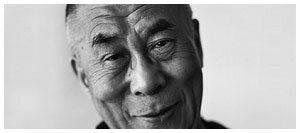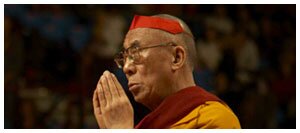HIS HOLINESS THE XIV DALAI LAMA
His Holiness Tenzin Gyatso, the XIV Dalai Lama, is the spiritual leader of Tibet. He was born on 6 July 1935, to a farming family, in a small hamlet located in Taktser, Amdo, northeastern Tibet. At the age of two was recognized as the reincarnation of his predecessor. The Dalai Lamas are believed to be manifestations of Avalokiteshvara, the Bodhisattva of Compassion and patron saint of Tibet.
He received a monastic education from principal contemporary Tibetan masters from the age of six and when he turned twenty-three he graduated with honors earning the maximum degree of Ghesce Lharampa or the equivalent to a doctorate of Buddhist philosophy.
In 1950, although he was still very young and hadn’t finished his studies, he was called upon to assume complete political power of his country due to its sudden political collapse after the Chinese invasion in 1949. After having done his best to find a peaceful solution to the situation by meeting with principal Chinese leaders, following the brutal repression of the Lhasa revolt in 1959, he was forced to flee to India.
Since then he has been living in Dharamsala, northern India, the seat of the Tibetan political administration in exile. From there he has never stopped carrying out the task of taking care of his people, both by helping the refugees in every way possible and by looking to give authenticity - always with dialogue and non violence - to the human rights in Tibet. He has also continually made an effort to preserve the integrity and culture of Tibetan society. His requests are synthesized in the Five Point Peace Plan for Tibet. This was presented to the United States Congress in 1987 and to European Parliament the following year. This peace plan proposes the transformation of the whole of Tibet into a zone of peace, the abandonment of China's population transfer policy that threatens the very existence of the Tibetans as a people, respect for the Tibetan people's fundamental human rights and democratic freedoms, the restoration and protection of Tibet's natural environment and the abandonment of China's use of Tibet for the production of nuclear weapons and dumping of nuclear waste, the commencement of earnest negotiations on the future status of Tibet and of relations between the Tibetan and Chinese peoples.
He has always opposed the use of violence and instead looked for peaceful solutions. Proponent for a more in depth understanding between nations and religions he has encountered numerous political, religious and state leaders since 1967.
As the leader of his people he gave life to the process of democratization when he abandoned all political responsibility in favor of a government in exile, democratically elected among the members of the Tibetan dispersed.
Together with his effort towards peace and his people he has continued to teach Buddhism and meditate for more than five hours daily.
His Holiness continuously gives teachings to his numerous disciples scattered throughout all parts of the world. His conferences and teachings have never had a political scope but instead have been authentic lessons in life, peace, tolerance, and compassion. The Dalai Lama has transmitted these teachings with one intention in mind, which is to give his contribution to peace and universal brotherhood. For this reason more and more people are attracted to him from all parts of the world each year.
His Holiness has three main commitments in life: on a human level it is to promote human values such as compassion, forgiveness, and tolerance; on a religious level it is to promote religious harmony and understanding among the world’s major religious traditions; and lastly it is to find a resolution for the Tibetan people.
He has also encouraged and participated in many inter-religious encounters, and met with exponents of the scientific world. He is convinced that science and religion are not contradictions as both are looking for the truth and well being of humans.
His Holiness is also the author of numerous Buddhist texts, and ones on the relationship between religion, science and the environment. During his life the Dalai Lama has received numerous honors and awards, such as the Nobel Peace Prize in 1989, for his works. Apart from these official recognitions His Holiness, who considers himself "a simple Buddhist monk", has given his life to simplicity and humility - because of his extraordinary affection for all beings, his capacity to transmit - always and in every situation - constructive messages of tolerance, peace and dialogue - the constant effort put into overcoming barriers and incomprehension with communication - and for his love for truth - he can surely be considered one of the most noted people of our time.
For further information please visit the official website: www.dalailama.com






